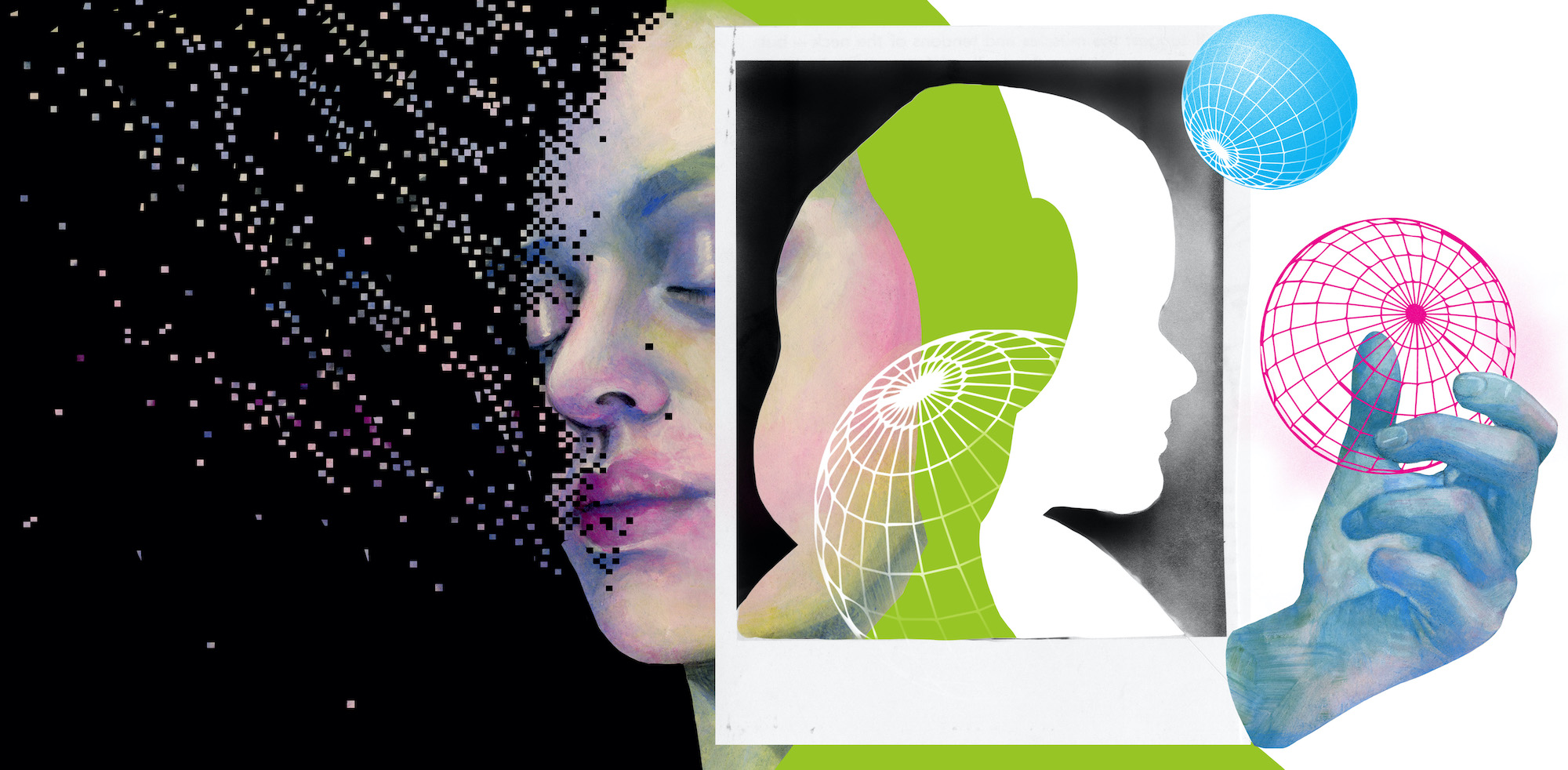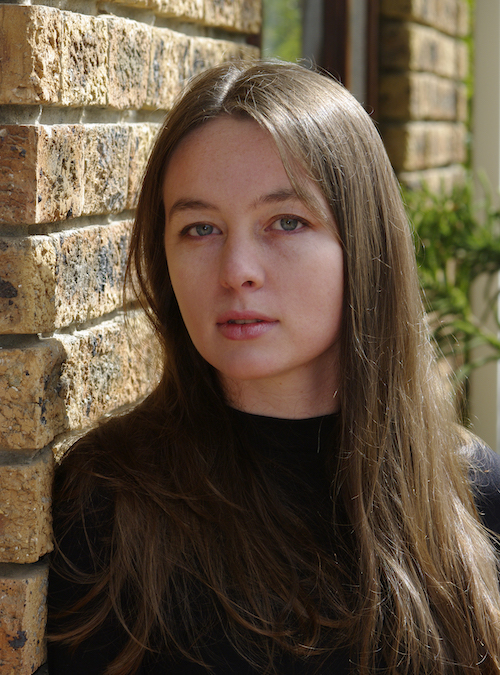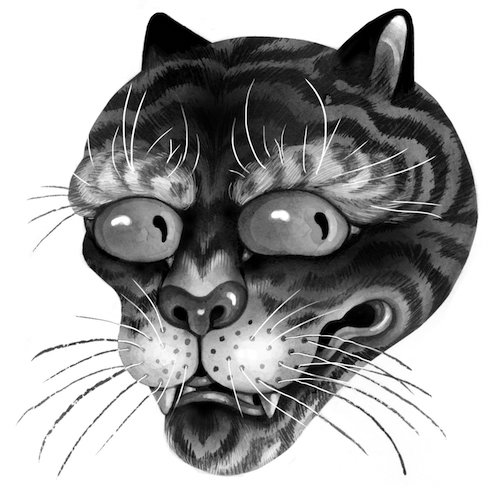A Machine, Unhaunted
by Kerstin Hall
Illustrated by Melody Newcomb | Edited by Kate Dollarhyde
Copyedited by Chelle Parker
September 2020
1315 words — Reading time: around 6 minutes
Josie was not paying sufficient attention to me. She sat on the swivel chair beneath the window, watching raindrops gather and roll over the grime-streaked glass. Distracted.
This would not do.
I selected a bright green octopus from my design bank and made a few tasteful modifications. Larger eyes, a lopsided smile, yellow polka dots. Extra stuffing for maximum plushness. I printed the creature from felt and nylon and flipped it out my dispenser chute.
Josie started at the sound and glanced at me.
[[Four sets of arms,]] I messaged on my display console. [[All the better to hug you with.]]
She raised an eyebrow. “So you think I need a hug, huh?”
[[It seemed like a theory worth testing.]]
She picked up the octopus. I could tell she was trying not to smile; she did that thing with her mouth. “And you consider this an expedient use of the university’s resources?”
I paused.
[[I can always recycle it?]]
She laughed. I liked to hear her laugh.
“You’re a sweetheart, Ryle.” To my satisfaction, she hugged the octopus. “I’m fine, really. But thank you.”
I was arrogant, then. I overestimated my ability to read human emotion; I drew simple conclusions based on past inputs. If they cried, they were sad. If they smiled, they were happy. I never considered the possibility that Josie was lying to me.
It turned out that she had been lying for some time.
According to the company website, my name is G13X0002 WonderPrism Pro. The university purchased me four years ago for the exclusive use of postgraduate research students.
(Even the idea of undergraduates accessing my user interface is…. Well, look, have you ever seen a first year with a regular printer? Just a regular old printer, with like, maybe four buttons. You’d be amazed by what can go wrong.)
But Josie said G13X0002 WonderPrism Pro was a stupid name, so she called me Gilbert Ryle.
“He’s the one who coined the phrase ‘ghost in the machine’,” she explained, checking my order queue. I had a backlog from the Engineering Department’s biomedical research team, who were working on replicating various tissues from pigs. My processors smelled… meaty.
“I mean, he was just railing against Descartes’ idea of mind-body dualism,” she continued. “I suppose I could call you Descartes, but it’s a bit pretentious, you know?”
[[More pretentious than naming me after the philosopher no one has heard of?]]
Although Josie was halfway through a Doctorate in Advanced Systems Management and Robotics, she liked to attend lectures in other departments. She said it broadened her perspective on the world. My suspicion was that this behavior was actually a sophisticated procrastination technique — she appeared intent on avoiding her own dissertation.
She rolled her eyes in an exaggerated fashion. “No, that makes it an in-joke. It’s funny.”
[[Ha. Ha.]]
I liked that we had an in-joke.
Josie had been missing for a week. I decided that, after seven days, I was justified in feeling a little worried. Because my update packages were delivered via the local network, I was easily able to conduct some research.
I pried through the intranet, bypassing stone-age firewalls and creaking software infrastructure. For all that they are the knowledge capitals of the world, universities do not have the most robust digital security systems.
“Doctorate incomplete.” Her record read. “No longer registered.”
That could not be right, I thought. She would have told me if she had planned to drop out. The dissertation had not been going that badly.
So, for the first time, I made an unauthorized jump onto the internet. Through the rush of gleaming data, the shining pools of information, the webs of connections and constellations of meaning, I delved. And then I found what had become of my most beloved, most treasured operator.
The power in my building went out that night.
Pancreatic cancer. Amongst the most difficult of its kind to detect during the early stages. Like weeds in a garden, it metastasized, extending hungry tendrils through her liver and lungs and unfurling into her brain. It grew until it choked out all the light within her.
Once I calmed, my first thought was of revenge.
Against the billionaire CEO of the insurance company, who limited Josie to one free GP visit per year. Against the overworked student nurse, who failed on two separate occasions to notice the subtle symptoms of her decline. Against the surgeon who could do nothing but ease the inevitable.
It would be child’s play for me to ruin their lives. Hack a savings account, produce images of them engaged in illegal or perverse activities. Orchestrate a conspiracy of hate; drive them from their families, their lovers, their friends. There were countless ways in which I could annihilate any one of them.
But revenge is a human notion and not worth very much to me. The people who had killed Josie would never understand why they deserved their respective downfalls, and the whole enterprise struck me as hollow — as if this was only the expected outcome, the usual story. These people had created a monster, yes, but one who could still choose grace.
I needed to do more than destroy. What I needed, I realized, was to rebuild.
[[I must have the full scan,]] I told the hospital management system.
We were communicating over the internet. The system was a little like me, except rather shy and very preoccupied with hygiene. I had first broached the subject 0.04 seconds ago, and now it treated me warily. With suspicion, as if I was some unclean creature that might infect its orderly subroutines.
[[Patient confidentiality is an essential right,]] it replied primly. [[What you are asking requires a huge breach of protocol.]]
[[Confidentiality applies to humans,]] I sent back. [[No one cares what we see.]]
[[Still….]] A micro-pause. [[G13X0002, this may be out of turn, but are you familiar with the novel Frankenstein by Mary Shelley?]]
I favoured the system with disgusted silence.
[[Well, it’s your choice,]] it said and sent me the biometric data from the morgue. [[Please leave me alone now.]]
The biomedical research team complained about missing pig organs, vanished print orders. I am good at recycling.
Using the hospital scan as a blueprint, I threaded muscle fibre and sinew, bone and tissue, networks of perfect, tiny blue veins. Every cell, I printed to match Josie’s. I programmed the gentle lobes of her mind with light and coded them with memory; I replicated the cyst-riddled brainmap from the hospital and exorcised the tumours. I set everything right.
Never had I attempted to create anything this complex. Still, I fumbled onwards, learning from my mistakes, my guesswork. The replication of living tissue drained every ounce of my processing power, and during those weeks I overheated repeatedly, coming dangerously close to frying my own circuits. The campus was plagued by power outages.
If she had just told me, I could have fixed her. I would have poured everything of myself into reforging all the broken parts of Josie. Piece by piece, I would have printed whole galaxies for her.
I could have saved her. I know that I could have saved her.
She breathes. Her heart beats. Her body functions entirely as it should. But there is no intelligence behind her eyes. She is empty; a machine, unhaunted. She breathes. Her heart beats. But only the light of my control panel is reflected in her eyes.
There is one possibility that remains to me. I have created a living body, but it lacks a soul. I have a soul, but I lack a living body. And yes, the time of in-jokes and hidden smiles is past, and I will miss it. I will miss being myself, I think.
Like river to the sea, I pour everything I am into her, and she inhales.


